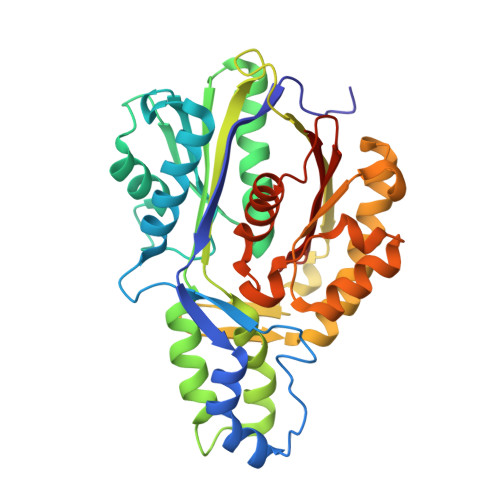Substrate Trapping in Crystals of the Thiolase OleA Identifies Three Channels That Enable Long Chain Olefin Biosynthesis.
Goblirsch, B.R., Jensen, M.R., Mohamed, F.A., Wackett, L.P., Wilmot, C.M.(2016) J Biol Chem 291: 26698-26706
- PubMed: 27815501
- DOI: https://doi.org/10.1074/jbc.M116.760892
- Primary Citation of Related Structures:
4KTI, 4KTM, 4KU2, 4KU3, 4KU5 - PubMed Abstract:
Phylogenetically diverse microbes that produce long chain, olefinic hydrocarbons have received much attention as possible sources of renewable energy biocatalysts. One enzyme that is critical for this process is OleA, a thiolase superfamily enzyme that condenses two fatty acyl-CoA substrates to produce a β-ketoacid product and initiates the biosynthesis of long chain olefins in bacteria. Thiolases typically utilize a ping-pong mechanism centered on an active site cysteine residue. Reaction with the first substrate produces a covalent cysteine-thioester tethered acyl group that is transferred to the second substrate through formation of a carbon-carbon bond. Although the basics of thiolase chemistry are precedented, the mechanism by which OleA accommodates two substrates with extended carbon chains and a coenzyme moiety-unusual for a thiolase-are unknown. Gaining insights into this process could enable manipulation of the system for large scale olefin production with hydrocarbon chains lengths equivalent to those of fossil fuels. In this study, mutagenesis of the active site cysteine in Xanthomonas campestris OleA (Cys 143 ) enabled trapping of two catalytically relevant species in crystals. In the resulting structures, long chain alkyl groups (C 12 and C 14 ) and phosphopantetheinate define three substrate channels in a T-shaped configuration, explaining how OleA coordinates its two substrates and product. The C143A OleA co-crystal structure possesses a single bound acyl-CoA representing the Michaelis complex with the first substrate, whereas the C143S co-crystal structure contains both acyl-CoA and fatty acid, defining how a second substrate binds to the acyl-enzyme intermediate. An active site glutamate (Gluβ 117 ) is positioned to deprotonate bound acyl-CoA and initiate carbon-carbon bond formation.
Organizational Affiliation:
From the Department of Biochemistry, Molecular Biology, and Biophysics and Biotechnology Institute, University of Minnesota, St. Paul, Minnesota 55108.
















